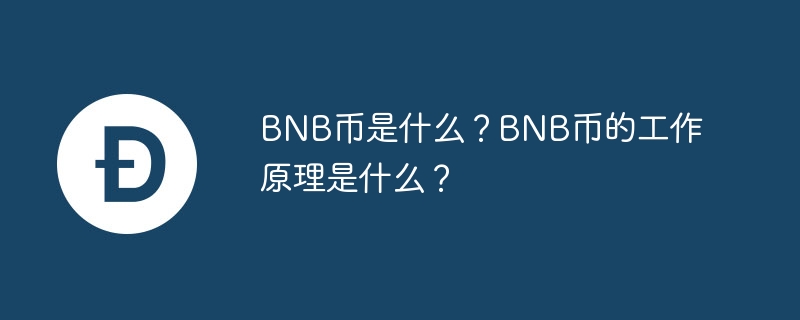What is BNB coin? How does BNB coin work?
- PHPzOriginal
- 2024-03-17 09:00:051488browse

BNB Coin: The native token of Binance platform
BNB Coin (Binance Coin) is the native token launched by Binance Exchange and was first issued in July 2017 . In the Binance ecosystem, BNB coin plays a key role, providing users with multiple benefits and features.
How BNB coin works
BNB coin is based on the Ethereum blockchain and is an ERC-20 token. It is mainly used for the following purposes:
- Transaction fee discount: Use BNB coins to pay the transaction fee of Binance Exchange and get a discount.
- Participate in Binance Launchpad: Holding BNB coins can participate in the token sale on Binance Launchpad and obtain the first right to purchase new project tokens.
- Mortgage and Pledge: Mortgage and pledge BNB coins to Binance to obtain benefits from BNB Vault.
- Community governance: BNB coin holders can participate in Binance community governance and make suggestions and vote on the development of the platform.
Advantages of BNB Coin
As an important part of the Binance ecosystem, BNB Coin has the following advantages:
- Practicality: BNB Coin It has a wide range of application scenarios on the Binance platform, providing convenience and benefits to users.
- Liquidity: BNB coins have high liquidity on Binance exchange and many other exchanges, making it easy for users to buy, sell and use.
- Value growth: The price of BNB coins has increased significantly since its issuance, bringing considerable benefits to holders.
- Community Support: BNB Coin has a large and active community that provides support and promotion for the token.
Summary
BNB coin is the native token of Binance exchange and plays an important role in the Binance ecosystem. It provides users with functions such as transaction fee discounts, participation in new project token sales, mortgage staking, and community governance. BNB coin has advantages such as utility, liquidity, value growth, and community support, making it a popular token in the cryptocurrency market.
The above is the detailed content of What is BNB coin? How does BNB coin work?. For more information, please follow other related articles on the PHP Chinese website!
Related articles
See more- Machine Learning for Blockchain: The Most Important Advances and What You Need to Know
- How to use Go language for blockchain wallet development?
- Japan cancels tax on unrealized profits from cryptocurrencies! It is expected to promote the development of Web3
- How to check the latest price of BNB coin?
- Yiou Exchange app official website download Apple

